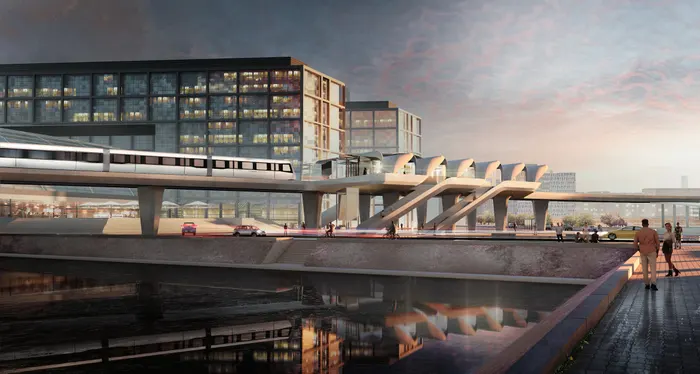Plans for a driverless magnetic train that would run through Berlin and carry passengers and goods are said to be under way as part of the local government’s attempts to boost the German capital’s green credentials.
The project, which is put forward by the city’s new conservative-led government, is said to have sufficient political backing and, say its backers, would help Berlin achieve its goal to become net zero by 2045.
The parliamentary faction leader of the Christian Democrats (CDU) has said that a 5-7km pilot stretch of magnetic levitated railway (maglev) at an estimated cost of €80m-€85m (£70m-£74m) could be in use within two years, Dirk Stettner, citing the advantages of a magnetic train above the existing, extensive underground and overground networks.
At a time when Berlin’s transport company, the BVG, is so short of drivers that it has reduced its timetable by about 7%, Stettner said the fact that the train was self-driving as well as cheaper and easier to construct than an underground line was a further advantage.
However, environmentalists have condemned the plans, countering CDU claims that the trains were futuristic and calling them expensive, energy-hogging and vain instead.
Read also: Central Europe After heavy rain, Rivers remain high in parts of Northern
The project seeks to among other things, resurrect the so-called M-Bahn of the 1980s, from Kreuzberg to Tiergarten in the western section of the city. A test-stretch was running by 1984, and was in regular use.
Recall that It was dismantled in 1991, two years after the fall of the Berlin Wall, to allow for the restoration of the U2 underground line, which had been cauterised by the erection of the notorious cold war barrier that cut the city in two.
At a recent presentation of his plans, including slick architectural sketches, Stettner said there were many ideas on how to practically make use of a new M-Bahn in a city that retained the scars of division.
“We want to choose a good test route, which makes sense from a logistical point of view, and to ensure that it stays as part of a whole network and is not seen as temporary,” he said.
Ute Bonde, the head of the VBB transport network that links the neighbouring federal states of Berlin and Brandenburg, voiced her support for the plan and said Berlin, which remained heavily dependent on cars, was in need of innovative ideas to persuade people out of their cars and on to trains.
Story was adapted from the Guardian.
